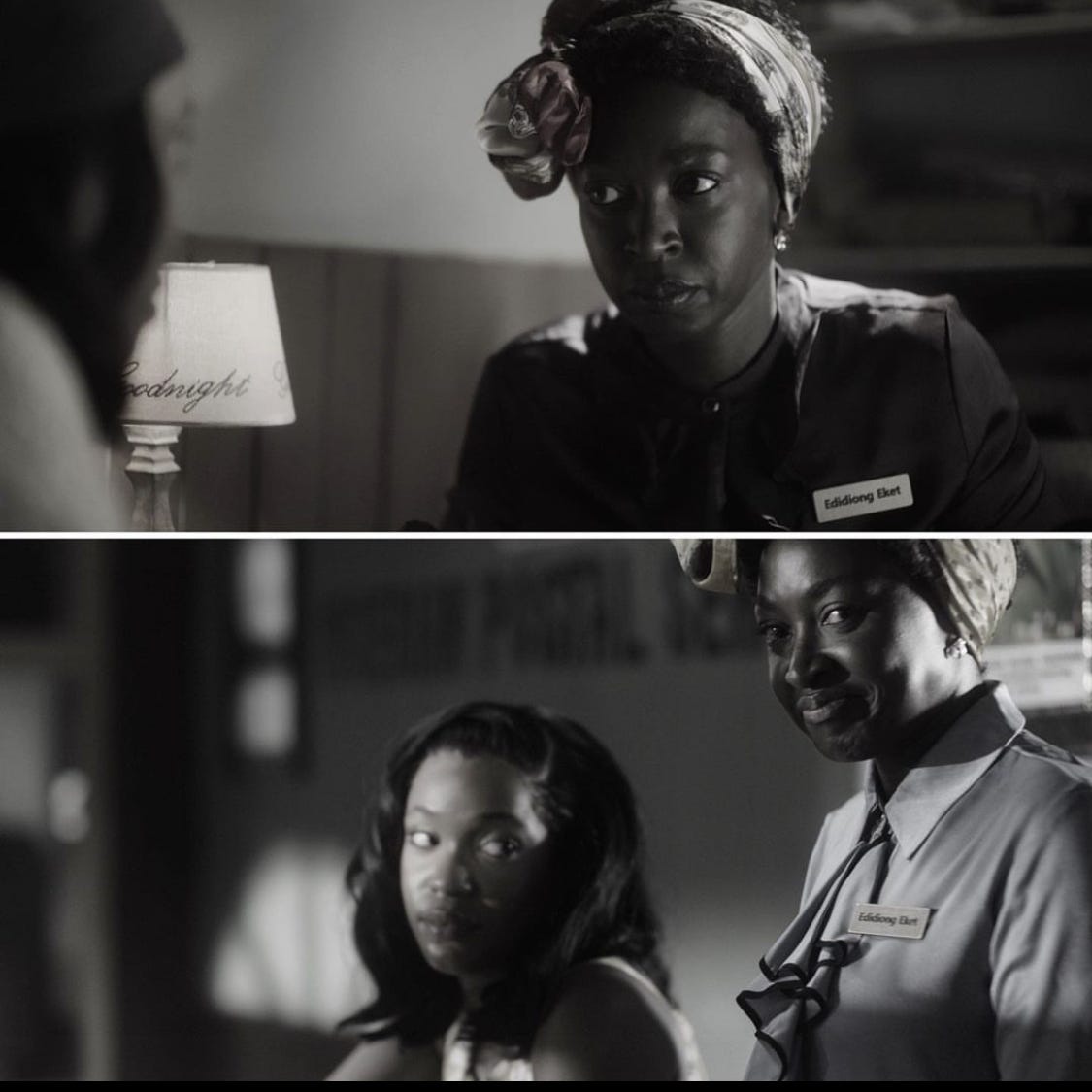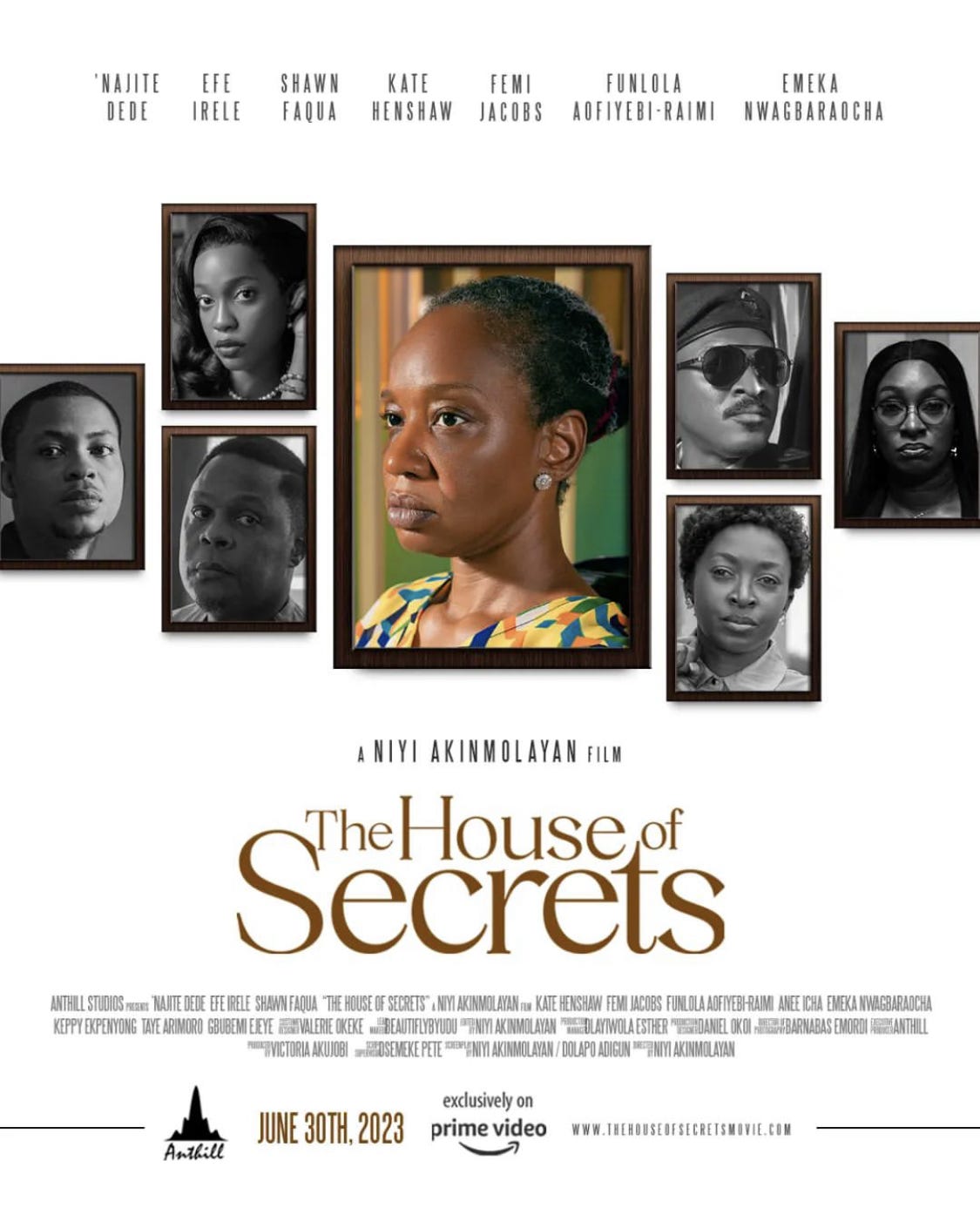The House of Secrets: A Captivating Noir Thriller with a Dash of Political Drama
Could this be Anthill Studios' best film yet?
Starring: Shawn Faqua, Efe Irele, Onajite Dede, Kate Henshaw, Keppy Ekpenyong, Femi Jacobs, Taye Arimoro, and Emeka Nwagbaraocha, among others.
Screenplay: Niyi Akinmolayan and Dolapo Adigun
Director: Niyi Akinmolayan
We often say, "Better not to judge a book by its cover," but our natural biases can often hinder us from appreciating the true beauty of something before us. If you were quick to judge Anthill Studios' The House of Secrets and turned off the screen within a few minutes, thinking you had seen enough, then you have likely missed out on one of the studio's and Director Niyi Akinmolayan's strongest movies since 2016's The Arbitration.
The House of Secrets follows Sarah (Onajite Dede, Efe Irele), a sheltered woman whose haunting past resurfaces when she is imprisoned as an accomplice to her spy lover, Panam (Shawn Faqua). Twenty years later, a group rescues her from jail and recreates a semblance of her old house to help her remember a secret number hidden by Panam.
When The House of Secrets begins, it does so with an unassuming premise. We witness an older Sarah's excitement about having something new to write about the young couple next door and their captivating expression of love. However, we soon learn that Sarah is wheelchair-bound and earns a living by writing and publishing her findings from snooping, anonymously contributing to a local publication. As we grapple with the legality and morality of this revelation, the rug is swiftly pulled out from under us, and the true psychological thriller that is The House of Secrets begins. It is at this point that patient viewers will begin to reap their rewards.
Deeply rooted in Nigeria's tumultuous political landscape, The House of Secrets shifts between two time periods to tell its story—the days leading up to the 1999 military-to-democracy transition and the present-day political tension during an election season. Although Sarah is not directly connected to the political machinations, she remains our anchor through these temporal leaps, captivating our attention as we strive to uncover the mystery at hand. Many questions arise, and Sarah seems to hold all the answers. The other characters and the viewers themselves yearn for answers, but the problem lies in Sarah's inability to remember them. The passage of time and the trials of life have taken their toll, transforming the once vivacious Sarah into a faded shadow of her former self. On the other hand, her lover, Panam, finds himself at the center of the controversy as a military officer, becoming the archetype of a hero who is willing to sacrifice what he loves most to do what is right. Yes, The House of Secrets is a tragic love story, and for the most part, Director Niyi Akinmolayan masterfully delivers it. Revelations unfold gradually, enveloping the viewer in a state of mild shock and sorrow without losing their focus. It may not be groundbreaking, but the creative direction exhibited here is truly impressive.
Niyi Akinmolayan is a commercial filmmaker who has worked on some of the biggest movies and with the largest film studios in Nigeria. To illustrate his commercial success, five of the movies he has worked on comfortably reside on the list of the top 50 highest-grossing Nigerian films of all time. He is a formidable force in the industry, but often his films lack a strong plot and fail to tell a compelling story. Some of his most significant critical disappointments include what I consider the most pointless Nollywood film of all time, Chief Daddy 2: Going for Broke, the underwhelming sequel to the once highest-grossing Nollywood movie, The Wedding Party 2: Destination Dubai, and the lackluster Silicon Valley-esque film The Man for the Job. These films share a common trait: they possess catchy premises that ultimately fail to deliver on their initial promise. It is a lamentable trend we have witnessed with the filmmaker for a long time, as despite the financial success of his movies, they tend to be forgettable due to their lack of substance.
Now, let me be clear—I do not claim that The House of Secrets is the next best thing since sliced bread. However, it is currently the closest thing Niyi Akinmolayan has to an art film, setting a precedent for what a smartly-told, aesthetically-pleasing film should look like in 2023 Nollywood. Furthermore, it paves the way for a flood of more noir films in the market—a discussion I expect to deepen when C.J. Obasi's Mamiwata hits the mainstream Nigerian market this September. Akinmolayan clearly steps out of his comfort zone for this film, and his filmography is better for it. The seamless transitions between color and black & white scenes are tastefully executed and thematically relevant to the story. The camera movement, production design, and set designs are like a chef's kiss, beautiful in nearly every scene. The story, despite its flaws, benefits from decent performances by actors who skillfully bounce off the energy offered by their more experienced co-stars. All of these elements contribute to the film's strengths, and for a moment, I found myself wishing The House of Secrets had a theatrical release before its Prime Video debut. It would have been a remarkable experience to see it come alive on the big screen.
With that said, The House of Secrets does have some shortcomings that cannot be ignored. I will highlight the most significant ones here, reserving the rest for the "Bad" section later in this review. While I commend the storytelling technique employed, I must also reprimand certain aspects of the core story that fail to make as significant an impact as the filmmakers intended. At the heart of The House of Secrets is a political thriller arc that struggles to break free, resulting in the movie being primarily remembered for its doomed romance story. General Sanni is depicted as a powerful figure in the Nigerian corridors of power since 1999. However, not only is his defeat disappointing but his ruthlessness, as implied and depicted, fails to come across as truly menacing as it could have been. This character is supposed to embody the average real-life Nigerian politician, and we all know the (alleged) traits associated with members of that club. Aside from the momentary shock value derived from the murder scene in his house, there isn't much to love or hate about the character. While one could argue that the main focus is on Sarah's life story, it's essential to remember that the hero of any story is often only as good as the villain they face. The list of adversaries in Sarah's life is incomplete without General Sanni, yet he remains one of the most underwhelming parts of the movie.
THE GOOD
The film boasts a decent story, elevated by smart storytelling techniques, particularly the well-handled introduction of the backstory.
The movie is aesthetically pleasing and visually impressive, with intentional and tastefully framed scenes, especially those in black & white. Kudos to Barnabas 'Barny' Emordi who catered to the cinematographic needs here.
The cast does their best to deliver mostly commendable performances amidst dialogue that sometimes came across as laborious —sometimes it’s enough, while other times it leaves the viewer cringing, but all the time Onajite Dede is an easy standout. Her portrayal of the older, broken Sarah is nothing short of exquisite.
The film stands out by setting its narrative against real-world Nigerian events from the past, adding to the relevance of movies like October 1, 1929, and Half of a Yellow Sun, shedding light on defining moments in the nation's history.
The movie fearlessly sheds light on shady dealings by some NGOs.
The use of music is applaudable.
The parallel drawn between the RPP party, led by Rt. General Sanni and present-day political scenarios are noteworthy.
THE BAD
The backdrop of characters at the NGO office lacks depth and struggles to communicate their purpose, resulting in underwhelming tension despite how often the stakes are implied to be high. However, the bulk of their actions serves as a reminder that people with good intentions can sometimes resort to questionable means.
Panam's inconsistent Hausa language accent raises eyebrows. It continues to shift noticeably as the plot unfolds, revealing inconsistencies between the character and the actor's ethnicities.
Some of Panam's fighting moves seem unrealistic for a Nigerian soldier. Was that Karate he was showing off?
Efe Irele's performance falls short compared to Onajite Dede’s portrayal of the older version of Sarah. This is less about the toll the 20-year gap takes on Onajite’s portrayal of the character, but more about Efe’s struggle to properly convey the character’s range through verbal and non-verbal expressions. The delivery in some of the shared scenes with the more-equipped Kate Henshaw (as Mrs. Eket) and Shawn Faqua's Panam suffer from this casting/directorial decision.
The political thriller arc feels underdeveloped, impacting the film's overall impact.
Some characters, like Esther and Mrs. Lawal (Funlola Aofiyebi-Raimi), lack significant utilization, potentially making their roles expendable.
THE UGLY
N/A. The House of Secrets holds no ugly aspects, showcasing an overall impressive film.
In conclusion, "The House of Secrets" weaves an intriguing narrative, skillfully exploring the past against the backdrop of Nigerian history while delivering impressive aesthetics and performances. Director Niyi Akinmolayan proves his artistic versatility with this film, stepping beyond his comfort zone. Though not without its flaws, this movie stands as a significant contribution to the growing genre of noir films in the Nigerian film industry, leaving audiences captivated by its thriller elements and tragic love story.






